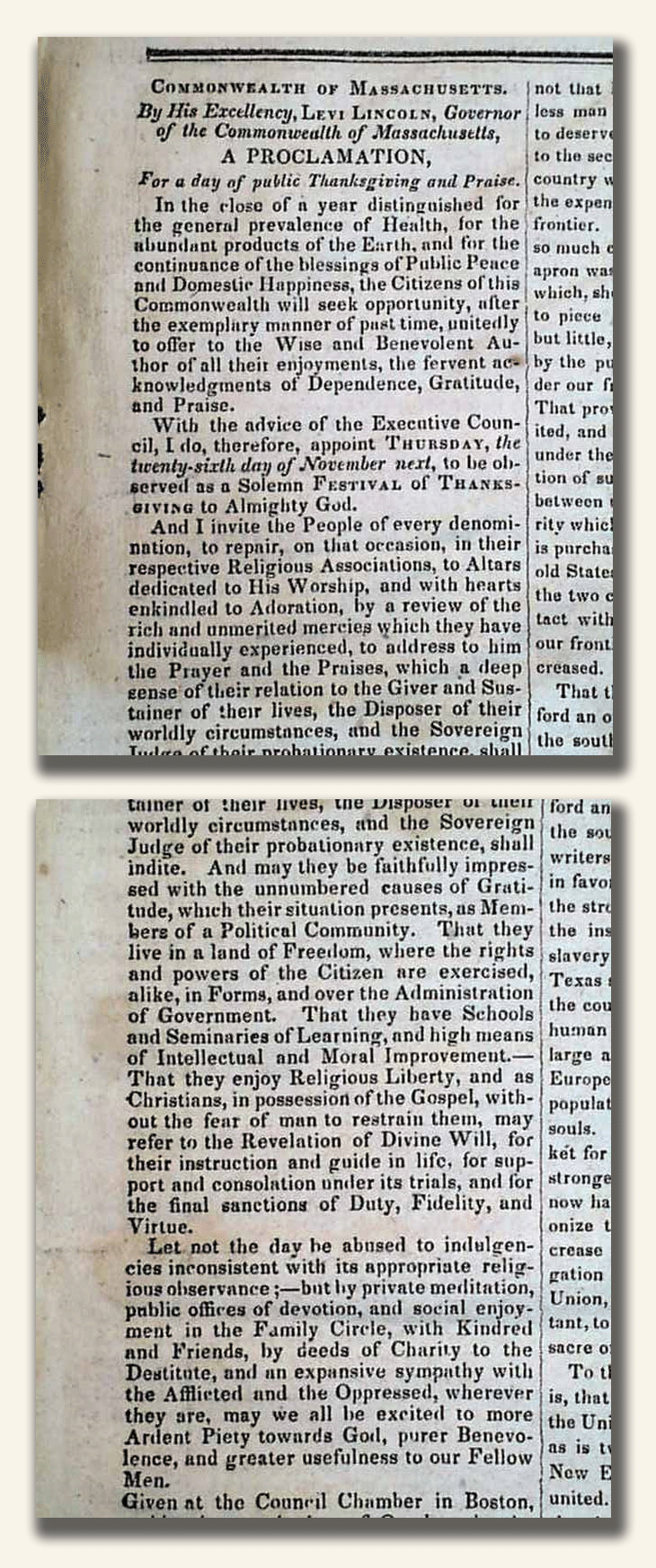The “top ten”: 18th century…
December 14, 2009 by TimHughes · 9 Comments
Continuing with our “top ten events to be found in newspapers” for various periods of time, today we consider the 18th century.
What an event-filled one hundred years it was. As you can tell by the list my focal point is on the American Revolution, but there are other events or specific newspapers which made it into my top ten.
Again I offer apologies to our non-American friends as this list has a decidedly American bias, primarily because the vast majority of those who purchase from us are American.
Here we go, starting with number ten:
 10) Death of George Washington, 1799 (Front page, preferably in a Virginia Gazette)
10) Death of George Washington, 1799 (Front page, preferably in a Virginia Gazette)
9) Hanging of Captain Kidd, 1701 (Just can’t resist a great pirate hanging, he being perhaps the most famous of all time)
8.) Any newspaper with the first installment of Paine’s “The Crisis” (“These are the times that try men’s souls…” has to be one of the more famous beginnings of all time)
7) Full text of the Stamp Act (Certainly a trigger event that would lead to the Revolution)
6) Boston Tea Party (In a Boston newspaper. An event every school kid knows about)
5) The Pennsylvania Journal, Nov. 1, 1765 “skull & crossbones” engraving (Replaced its normal masthead on this date: seen in most history books)
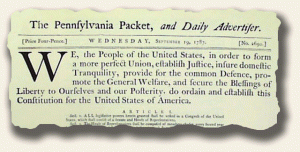 4) Battle of Lexington & Concord with mention of Paul Revere’s ride (The beginning of the Revolutionary War. I had one once with mention of Revere–exceedingly rare–great to have in a Boston area newspaper)
4) Battle of Lexington & Concord with mention of Paul Revere’s ride (The beginning of the Revolutionary War. I had one once with mention of Revere–exceedingly rare–great to have in a Boston area newspaper)
3) The Boston News-Letter, 1704 (Great to have issue #1 of America’s first successful newspaper, but any issue from 1704 would do)
2) The Pennsylvania Packet, Sept. 19, 1787 (First newspaper to print the Constitution, & done in broadside format. Need I say more?)
1) The Declaration of Independence, 1776 (Ideally the Pennsylvania Evening Post, July 6, 1776, but the Packet of July 8 would work too as it contains the Declaration entirely on the front page: better for display).
How shall we address the President?
August 31, 2009 by TimHughes · 2 Comments
Although we may think it odd today, back in 1789 when our federal government was just being formed and George Washington was inaugurated as America’s first President, there was little precedence as to how to address the new chief executive of the government. The only examples given by the European powers were royalty where “your highness” or “your excellency” were appropriate. But what about a democratically elected President?
The article shown is taken from the “Gazette of the United States” newspaper from New York, May 16, 1789, about two weeks after Washington was inaugurated. It provides some interesting insight in to the thoughts of the day when the government was truly in its infancy.
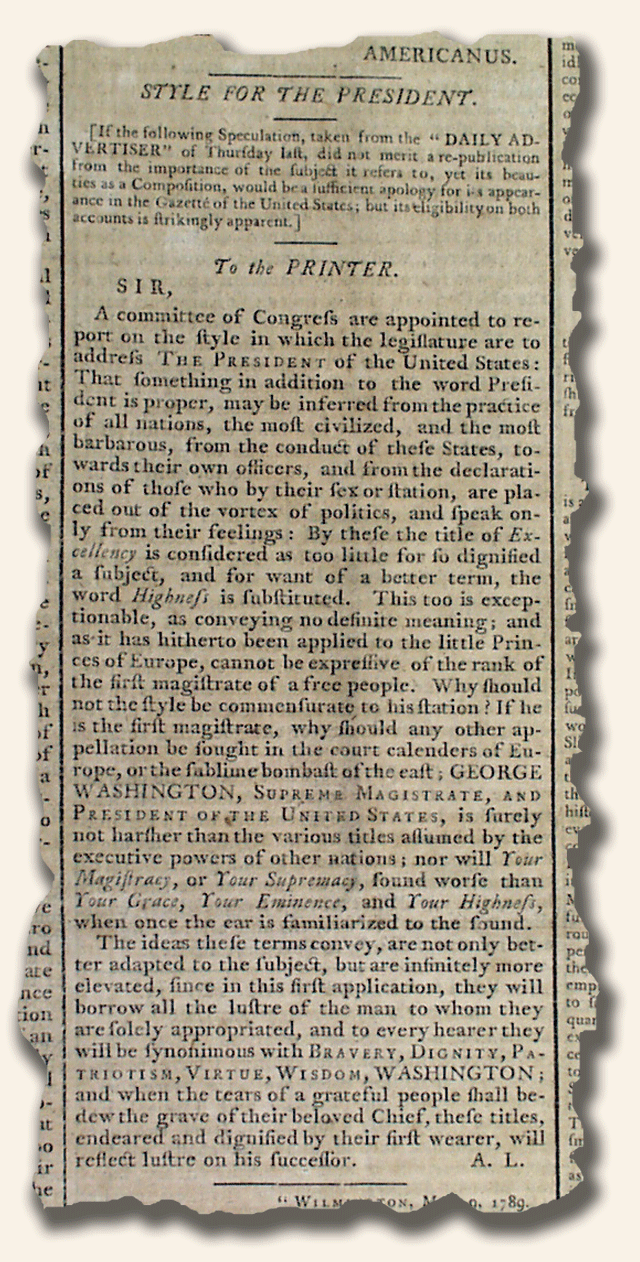
Thanksgiving… I time to be thankful…
November 26, 2008 by GuyHeilenman · Leave a Comment
The title seems to be a bit absurd; or is it? In a land of abundance we often take our blessings for granted. Good health, a roof over our head, knowing where our next meal is 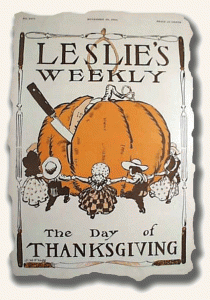 coming from, being surrounded by loved ones, having a warm place to stay, safety – all of which we rarely need to question – are before us day in and day out. Our freedoms – of speech, of religion, of the right to bear arms, of political expression, of the pursuit of happiness, etc. – the list of things for which we should be thankful pervade every aspect of our lives. For most of us our greatest concern this Thanksgiving will be deciding on the time we plan to eat and whether we should have dessert before or after the football game. This abundance affords us the luxury to focus on such intellectual discourse as whether or not the Pilgrim story we learned as children actually occurred, or if it occurred in the manner we were taught. There is nothing wrong with this. However, this year, let’s take a respite from our intellectual pursuits and spend time engaging in matters of the heart. George Washington grasped the importance of a thankful heart when he made the first Thanksgiving proclamation:
coming from, being surrounded by loved ones, having a warm place to stay, safety – all of which we rarely need to question – are before us day in and day out. Our freedoms – of speech, of religion, of the right to bear arms, of political expression, of the pursuit of happiness, etc. – the list of things for which we should be thankful pervade every aspect of our lives. For most of us our greatest concern this Thanksgiving will be deciding on the time we plan to eat and whether we should have dessert before or after the football game. This abundance affords us the luxury to focus on such intellectual discourse as whether or not the Pilgrim story we learned as children actually occurred, or if it occurred in the manner we were taught. There is nothing wrong with this. However, this year, let’s take a respite from our intellectual pursuits and spend time engaging in matters of the heart. George Washington grasped the importance of a thankful heart when he made the first Thanksgiving proclamation:
General Thanksgiving
By the PRESIDENT of the United States Of America
A PROCLAMATION
WHEREAS it is the duty of all nations to acknowledge the providence of Almighty God, to obey His will, to be grateful for His benefits, and humbly to implore His protection and favor; and Whereas both Houses of Congress have, by their joint committee, requested me “to recommend to the people of
the United States a DAY OF PUBLICK THANKSGIVING and PRAYER, to be observed by acknowledging with grateful hearts the many and signal favors of Almighty God, especially by affording them an
opportunity peaceably to establish a form of government for their safety and happiness:”
NOW THEREFORE, I do recommend and assign THURSDAY, the TWENTY-SIXTH DAY of NOVEMBER next, to be devoted by the people of these States to the service of that great and glorious Being who is the beneficent author of all the good that was, that is, or that will be; that we may then all unite in rendering unto Him our sincere and humble thanks for His kind care and protection of the people of this country previous to their becoming a nation; for the single and manifold mercies and the favorable interpositions of His providence in the course and conclusion of the late war; for the great degree of tranquility, union, and plenty which we have since enjoyed;– for the peaceable and rational manner in which we have been enable to establish Constitutions of government for our safety and happiness, and particularly the national one now lately instituted;– for the civil and religious liberty with which we are blessed, and the means we have of acquiring and diffusing useful knowledge;– and, in general, for all the great and various favors which He has been pleased to confer upon us.
And also, that we may then unite in most humbly offering our prayers and supplications to the great Lord and Ruler of Nations and beseech Him to pardon our national and other transgressions;– to enable us all, whether in public or private stations, to perform our several and relative duties properly and punctually; to render our National Government a blessing to all the people by constantly being a Government of wife, just, and constitutional laws, discreetly and faithfully executed and obeyed; to protect and guide all sovereigns and nations (especially such as have shown kindness unto us); and to bless them with good governments, peace, and concord; to promote the knowledge and practice of true religion and virtue, and the increase of science among them and us; and, generally to grant unto all mankind such a degree of temporal prosperity as he alone knows to be best.
GIVEN under my hand, at the city of New-York, the third day of October, in the year of our Lord, one thousand seven hundred and eighty-nine.
(signed) G. Washington
With Washington’s proclamation set before them, governors and elder statesmen have followed his lead ever since (view an example from October 28, 1829). Similar proclamations and the general national attitude of “thankfulness” have revealed themselves in countless historic newspapers.
Finally, on October 3, 1863, Abraham Lincoln’s nearly broken heart led him to make Thanksgiving a National (U.S.) Holiday:
By the President of the United States of America.
A Proclamation.
The year that is drawing towards its close, has been filled with the blessings of fruitful fields and healthful skies. To these bounties, which are so constantly enjoyed that we are prone to forget the source from which they come, others have been added, which are of so extraordinary a nature, that they cannot fail to penetrate and soften even the heart which is habitually insensible to the ever watchful providence of Almighty God. In the midst of a civil war of unequaled magnitude and severity, which has sometimes seemed to foreign States to invite and to provoke their aggression, peace has been preserved with all nations, order has been maintained, the laws have been respected and obeyed, and harmony has prevailed everywhere except in the theatre of military conflict; while that theatre has been greatly contracted by the advancing armies and navies of the Union. Needful diversions of wealth and of strength from the fields of peaceful industry to the national defense have not arrested the plough, the shuttle or the ship; the axe has enlarged the borders of our settlements, and the mines, as well of iron and coal as of the precious metals, have yielded even more abundantly than heretofore. Population has steadily increased, notwithstanding the waste that has been made in the camp, the siege and the battle-field; and the country, rejoicing in the consciousness of augmented strength and vigor, is permitted to expect continuance of years with large increase of freedom. No human counsel hath devised nor hath any mortal hand worked out these great things. They are the gracious gifts of the Most High God, who, while dealing with us in anger for our sins, hath nevertheless remembered mercy. It has seemed to me fit and proper that they should be solemnly, reverently and gratefully acknowledged as with one heart and one voice by the whole American People. I do therefore invite my fellow citizens in every part of the United States, and also those who are at sea and those who are sojourning in foreign lands, to set apart and observe the last Thursday of November next, as a day of Thanksgiving and Praise to our beneficent Father who dwelleth in the Heavens. And I recommend to them that while offering up the ascriptions justly due to Him for such singular deliverances and blessings, they do also, with humble penitence for our national perverseness and disobedience, commend to His tender care all those who have become widows, orphans, mourners or sufferers in the lamentable civil strife in which we are unavoidably engaged, and fervently implore the interposition of the Almighty Hand to heal the wounds of the nation and to restore it as soon as may be consistent with the Divine purposes to the full enjoyment of peace, harmony, tranquility and Union.
In testimony whereof, I have hereunto set my hand and caused the Seal of the United States to be affixed.
Done at the City of Washington, this Third day of October, in the year of our Lord one thousand eight hundred and sixty-three, and of the Independence of the Unites States the Eighty-eighth.
By the President: Abraham Lincoln
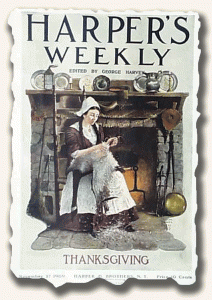 Matters of the heart. It is interesting to note both Washington’s and Lincoln’s historic Thanksgiving Proclamations came in response to war – moments when the citizenry was moved to lay down their differences to come together in unity (similar to what occurred on September 12, 2001 – the day after), and acknowledge the blessings which were common to all.
Matters of the heart. It is interesting to note both Washington’s and Lincoln’s historic Thanksgiving Proclamations came in response to war – moments when the citizenry was moved to lay down their differences to come together in unity (similar to what occurred on September 12, 2001 – the day after), and acknowledge the blessings which were common to all.
Being surrounded by historic newspapers, I am constantly reminded of the great & many sacrifices which have been made so my children can live in this land of abundance – in freedom and in safety. I am moved to challenge myself to take time to count my blessings (which are many), and to “come as a child” to the feast which will soon be set before me. I invite you to join with me in reflecting upon life’s simple pleasures, the memories of old, and the joys which warm the heart. It is with this in mind I leave you with:
A Boy’s Thanksgiving Day
by Lydia Maria Child
Over the river, and through the wood,
to Grandfather’s house we go;
the horse knows the way to carry the sleigh
through the white and drifted snow.
Over the river, and through the wood,
to Grandfather’s house away!
We would not stop for doll or top,
for ‘tis Thanksgiving Day
Over the river, and through the wood,
oh, how the wind does blow!
It stings the toes and bites the nose,
as over the ground we go.
Over the river, and through the wood
and straight through the barnyard gate.
We seem to go extremely slow—
it is so hard to wait!
Over the river, and through the wood,
when Grandmother sees us come,
she will say, “Oh dear, the children are here,
bring a pie for every one.”
Over the river, and through the wood—
now Grandmother’s cap I spy!
Hurrah for the fun! Is the pudding done?
Hurrah for the pumpkin pie!
Happy Thanksgiving!
from the staff of Timothy Hughes Rare & Early Newspapers… History’s Newsstand



